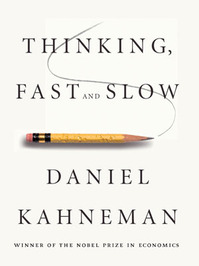
Source of book image: http://www.brainpickings.org/wp-content/uploads/2011/10/thinkingfastandslow.jpg
Daniel Kahneman first gained fame in economics through research with Tversky in which they showed that some of economists’ assumptions about human rationality do not always hold true.
Kahneman, whose discipline is psychology, went on to win the Nobel Prize in economics, sharing the prize with Vernon Smith. (Since the Prize is not normally awarded posthumously, Tversky was not a candidate.)
I have always thought that ultimately there should be only one unified science of human behavior—not claims that are “true” in economics and other claims that are “true” in psychology. (I even thought of minoring in psychology in college, before I realized that the price of minoring included taking time-intensive lab courses where you watched rats run through mazes.)
But I don’t think the implications of current work in behavioral economics are as clear as has often been asserted.
Some important results in economics do not depend on strong claims of rationality. For instance, the most important “law” in economics is the law of demand, and that law is due to human constraints more than to human rationality. Gary Becker, early in his career, wrote an interesting paper in which he showed that the law of demand could also be derived from habitual and random behavior. (I remember in conversation, George Stigler saying that he did not like this paper by Becker, because it did not hone closely to the rationality assumption that Stigler and Becker defended in their “De Gustibus” article.)
The latest book by Kahneman is rich and stimulating. It mainly consists of cataloging the names of, and evidence for, a host of biases and errors that humans make in thinking. But that does not mean we cannot choose to be more rational when it matters. Kahneman believes that there is a conscious System 2 that can over-ride the unconscious System 1. In fact, part of his motive for cataloging bias and irrationality is precisely so that we can be aware, and over-ride when it matters.
Sometimes it is claimed, as for instance in a Nova episode on PBS, that bias and irrationality were the main reasons for the financial crisis of 2008. I believe the more important causes were policy mistakes, like Clinton and Congress pressuring Fannie Mae and Freddie Mac to make home loans to those who did not have the resources to repay them; and past government bailouts encouraging finance firms to take greater risks. And the length and depth of the crisis were increased by government stimulus and bailout programs. If instead, long-term cuts had been made in taxes, entrepreneurs would have had more of the resources they need to create start-ups that would have stimulated growth and reduced unemployment.
More broadly, aspects of behavioral economics mentioned, but not emphasized, by Kahneman, can actually strengthen the underpinnings for the case in favor of entrepreneurial capitalism. Entrepreneurs may be more successful when they are allowed to make use of informal knowledge that would not be classified as “rational” in the usual sense. (I discuss this some in my forthcoming paper, “The Epistemology of Entrepreneurship.”)
Still, there are some useful and important examples and discussions in Kahneman’s book. In the next several weeks, I will be quoting some of these.
Book discussed:
Kahneman, Daniel. Thinking, Fast and Slow. New York: Farrar, Straus and Giroux, 2011.
The Becker article mentioned above is:
Becker, Gary S. “Irrational Behavior and Economic Theory.” Journal of Political Economy 70, no. 1 (Feb. 1962): 1-13.
The Stigler-Becker article mentioned above is:
Stigler, George J., and Gary S. Becker. “De Gustibus Non Est Disputandum.” American Economic Review 67, no. 2 (March 1977): 76-90.



